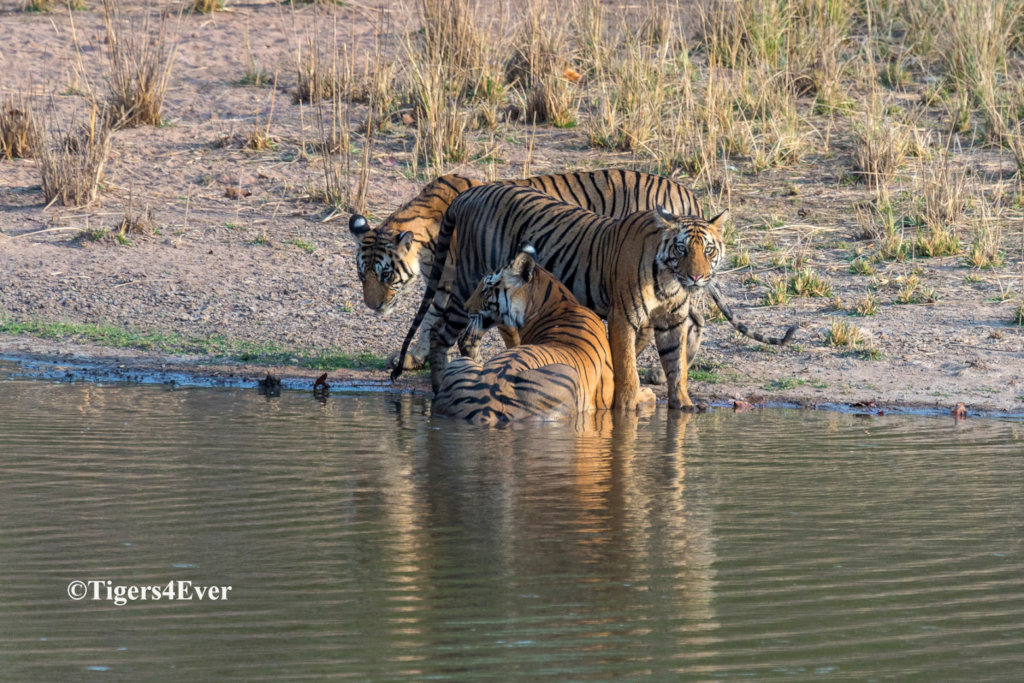By Dr. Corinne Taylor-Smith | Project Leader
We can hardly believe that a month has passed since the fateful morning when the phone rang with the news we’d been dreading since the COVID19 crisis began. For the first time in five and a half years, a tiger had been killed in Bandhavgarh by a retaliatory poisoning by villagers angered by the constant lifting of cattle. What made matters worse was it wasn’t one tiger which was dead, it was the mother of four cubs. A short distance from the dead tigress’s body lay a female cub which had also died after eating from the poisoned carcass of a dead cow. Three cubs were missing, their fate unknown. What made matters worse was the tigress was a long way from her native territory, for reasons we’ll never really know why. What we do know is that encroachment levels into tiger territory are at an all-time high as villagers desperate to find something to sell move further and further into areas where they shouldn’t go.
How could this happen? Since the lockdown began in March, we had increased our patrolling, even doubling it during the monsoon, but fearful for the long term sustainability of our patrolling due to a lack of funding, we took the difficult decision to reduce our patrolling by 33% from the beginning of October, this would help us to keep patrolling until the end of the year. Barely two weeks into the reduced patrolling, disaster struck. We had scaled back our patrolling to pre-monsoon levels, but the risk to the tigers is still increasing as the economic impacts of COVID19 decimate the wider tiger community. Our decision was costly in terms of tiger deaths as the days passed, only two cubs were found alive, a male cub had also perished as a result of the retaliatory poisonings. What is worse is the fact that this was the tigress’s first litter, not yet fully independent and without their mother, the chances of long term survival in the wild for the surviving cubs is by no means certain. Potentially, a lack of funding may have wiped out two generations of wild tigers. The cost of the additional patrolling was just £500 (US$665) per month… Funds we didn’t have.
We had an emergency appeal and, thanks to our tremendous supporters, have managed to raise sufficient funds to reinstate double patrolling in November and December, but we need to raise a lot more money if we are to sustain double patrolling into 2021. For this we need your help, this year on Giving Tuesday (01 December 2020) GlobalGiving is providing a share of $1million in matched funds for projects which receive donations throughout the day. We need to raise £5000 (US$6650), ideally on Giving Tuesday so that we can secure a share of the $1million in matched funds too and keep our patrolling doubled until April 2021: https://goto.gg/34704.
Without the above funds, we will have to scale back or even suspend our patrolling, the consequences of which are unimaginable. Since the end of March, our patrols have been under overwhelming pressure due to increased miscreant activity, to which there seems no end.
If we have to reduce the patrolling by 33%, as we were forced to do in October, to avoid running out of funds, it will mean a 500km (312 mile) reduction in the area covered by our patrols each month. A reduction which will hit hard alongside the impact of unprecedented encroachment levels in the forest, as people who have lost income due to the enforcement of COVID19 measures struggle to survive. These people are putting their lives at risk by going deeper and deeper into the forest in search of something to sell, the death and injury toll over the last 2 months reads like nothing we’ve known in over 10 years since we established Tigers4Ever:
Every time human-animal conflict increases, the risk to the lives of wild tigers increases, without our patrolling we cannot mitigate these risks and more tigers could die.
The only way we can address these issues is to keep our patrolling doubled until these risks subside. When increased to double levels, our patrols can cover an extra 500km (312 miles) of wild tiger territory each month, looking for snares, traps and signs of would be poisoners. Increased patrols also help to prevent the dangerous human encroachment into the territories of wild tigers which is increasing daily and to provide safety advice for those trying to protect their crops and livestock from wandering elephants and tigers respectively.
The only way we can do this is by increasing our funding by at least £5000 in December (preferably on Giving Tuesday – 01 December), but to do this we need your help. Your gift today can make a huge difference:
If we don’t act now, we are sure that the lives of more tigers and more humans will be lost, and with every loss of human life comes another threat to the tiger’s survival in the wild, thus we must protect both if we are to ensure that wild tigers will have a wild future.
Every single donation received will help us to save wild tigers’ lives, no matter how large or small. The current crisis means that we need your help like never before: https://goto.gg/34704.
Please don’t hesitate if you can help, your donation can be the difference between life and death for a wild tiger, as it helps to increase our patrolling when it is most needed. Every tiger and every tiger cub counts. Thank you for making our fight against poachers, the changing climate and human-animal conflict possible.
Links:
Project reports on GlobalGiving are posted directly to globalgiving.org by Project Leaders as they are completed, generally every 3-4 months. To protect the integrity of these documents, GlobalGiving does not alter them; therefore you may find some language or formatting issues.
If you donate to this project or have donated to this project, you can receive an email when this project posts a report. You can also subscribe for reports without donating.
Support this important cause by creating a personalized fundraising page.
Start a Fundraiser
